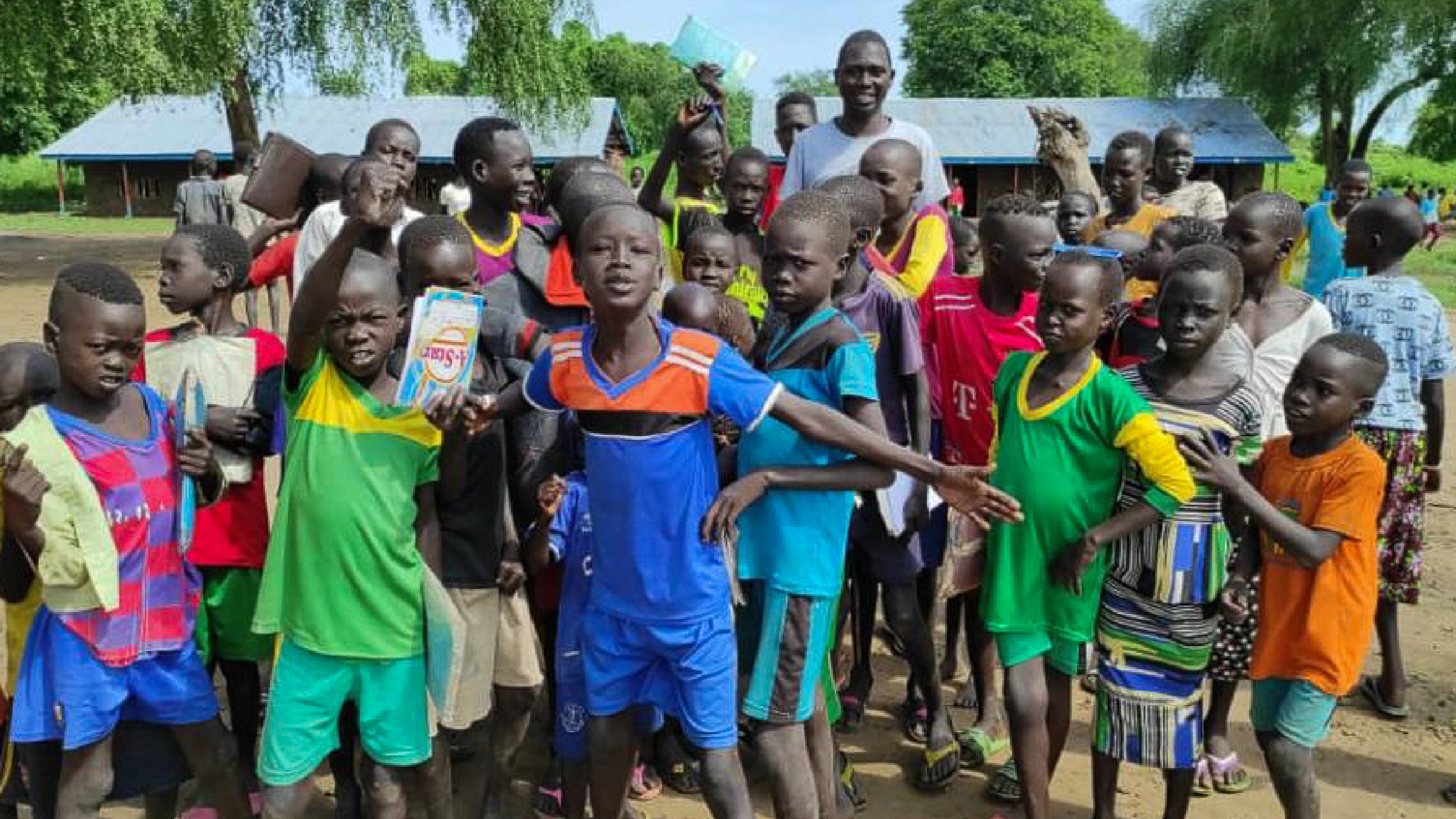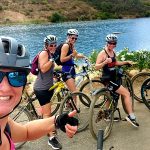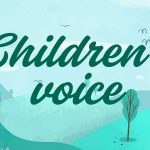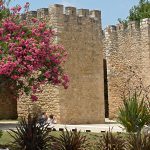Some time ago, my 12-year-old boy came home from school and told me that a very special couple had come to his class that day (the parents of a schoolmate). They taught him about the joy of giving and how life becomes truly fulfilling if you can make a difference in somebody else’s life.
WORDS Monique Jansse
My son recounted how this California-based family started travelling the world and now resides in Aljezur. They have supported over 30 projects focused on children and families worldwide, but it was the death of an 11-year old girl in their house in Spain that changed their perspective on life forever. For these and other reasons, I was intrigued.

Just one week later, I coincidentally met Ryan and Emily Rauch, the special couple, at Arrifana Beach. We clicked immediately and inspired by their stories, I asked them if we could also start supporting communities locally through their foundation. We are so fortunate to live here in Portugal, a country that is so welcoming to us, that I started thinking about what we could do in return?
Within a week they set up a WhatsApp group called Um Grão de Amor, and in no time, people from Aljezur and the surrounding area were joining and connecting people in need with those that wanted to give. The unconditional acts of kindness range from donating baby clothes to heaters, from homemade dollhouses to a warm meal and in many cases, simply giving a hug/love to those who need it the most. Since the outbreak of the war, finding and helping Ukrainian refugees coming to Portugal has become a priority as well.
So who are these beautiful, compassionate souls? I wanted to find out more and went to meet them at their lovely home in Espartal. There they told me more about their life journey.
Ryan starts. “I graduated from Yale University with honours and I started working as a Wall Street Medical Device Research Analyst. I worked more than 100 hours a week for 13 years. Despite being very successful according to the world’s definition of success, the more money I earned, the deeper the hole inside me became and I filled this emptiness with excessive drinking. Living the life of ‘Wall Street’ really distorted my ego and I was sick in a plethora of ways. At the age of 32, I put myself into a rehab program in California and learned after just two days of sobriety, that Emily (who is now my wife) was pregnant. Despite the advice of her family and everybody around her, she left California and a successful Wall Street career and much to my surprise, she decided to sacrifice everything to try to build a family together.”
Emily continues. “After our son turned one, the financial crisis started, and this is where my nomadism kicked in. I always had a lot of wanderlust in me and wanted to get out of the United States so that we could experience new things as a family. I said to Ryan: ‘Why don’t we just leave and start travelling?’ Our first 18-months together as a family was very difficult and we were definitely not a ‘Disney’ story. Leaving our lives and our identities was not easy, but I was convinced that we really needed to re-invent ourselves and try to discover our true meaning of happiness.”
Emily bought tickets to Japan and finally convinced Ryan to leave his career and start a new life together. Initially, the plan was to go backpacking in Southeast Asia for a year with their one-year-old son, Oliver.
The couple found they loved to travel the unbeaten tracks, go into villages, learn about new cultures, and meet the local people. “What we got from that experience was priceless,” says Ryan. “Travelling strips you down to the basic person that you are. Emily’s decision to have us leave everything and travel forced us out of our comfort zone, and that is where true happiness lies for us.”

After returning to the US, Emily became pregnant with their second child (this time the pregnancy was planned)! They tried to reintegrate, but they quickly realised that they could not relate to their old values and lifestyles and they quickly decided that they had to get away again. They simply could not go back to their old lives in California where they now noticed that everything revolved around money, jobs and being ‘successful’. Ryan remembers, “We had nothing in common anymore. So we packed up our car and travelled through all the national parks in the western part of the United States and again, it was very therapeutic. Without planning it, this nomadic life had become our new normal.”
When their daughter was still a baby, they flew off to Iceland and started travelling around Europe and Morocco for three and a half years. They began volunteering at orphanages and donated money to projects they came across during these travels.
When Ryan and Emily decided to have another child they settled in a tiny Andalusian village called El Gastor (with only 1,500 residents). Emily says, “It is one of the most intact Spanish cultures you will ever see. Super traditional, no foreigners. We bought a property, travelled a bit more and sent our kids to the local school where the town embraced us and our family. It was hard for them without a word of Spanish and they cried and cried, but kids are resilient and they quickly learned the language and the nuances of living in a small Spanish town.”
While using El Gastor as a home base, they decided to pick up again and travel to Turkey and Greece, exploring other parts of the world as well. Ryan and Emily had changed their singularly focused Wall Street lives into a passion for travel and showing their children all that the world has to offer.
But then disaster struck. Luena, the 11-year-old daughter of two of their closest friends in Spain, stayed over at their house for a sleep-over with her little brother. They all went to bed after a fun night of movies and pizza when Luena told Oliver, their oldest son, that she had a very bad headache. They went to where Luena was sleeping and saw she was convulsing and had lost consciousness.

It turned out that Luena had suffered a massive aneurysm and there was no way they could have saved her. For eight days they went to the hospital where she was in a coma and it was then that Ryan and Emily came up with the idea to start a foundation in her honour. Luena died on 11 March 2018, and her parents donated five of her organs (which saved five other children). The foundation was built to remember the legacy of love of Luena and to positively impact the lives of as many children as possible (as Luena loved kids and was a motherly figure even at the young age of 11).
Ryan and Emily quickly discovered that it was extremely hard to start a foundation in Spain, so they registered one in the U.S., run by a board made up of people they knew from their past working lives.
Ryan and Emily knew that the nonprofit world was filled with waste and exorbitant salaries, and hence, they decided that they would never make a dime from this endeavour and that 100% of the money they received from donors would be used to fund important projects around the world. Ryan and Emily are the second-largest donors and they cover all of the administrative expenses associated with the foundation. Another differentiating factor for Luena Foundation is that Ryan and Emily leverage their past Wall Street experience to perform hours of extensive due diligence to find the best ‘local’ partners and thought leaders, most of whom the larger aid organisations have never heard of.

In September 2018, Ryan and Emily and their three young children set off on another adventure and they moved to Bolivia to work in an orphanage for three months so they could learn more about the nonprofit world and to help children in need. They spent nearly two years travelling and volunteering in Bolivia, Chile and Argentina. As Ryan put it, “this time was invaluable for us as we learned that in order to empower local communities, we had to first listen and to change the perception that we would be their saviours. This trip was a turning point for us as it became clear that poverty has very little to do with food, housing, or money, but in general, it comes from a lack of education and opportunities. Hence, what was born was a localised approach that is driven by ‘thought’ leaders in the community. We are proud to say that our projects have had a 100% success rate due to the fact that we work with our partners every step of the way.”
When COVID came, the couple realised that it would be impossible to travel to meet all of their partners in person (as they had done in South America), so they went back to their desks and researched and talked to everybody that they could. Emily recalls “We spent close to seven hours or more per day on the phone trying to make sure that we had the best partners comprised of the best people. To put it simply, you also have to make them invest in themselves. The community has to do an ‘in-kind’ investment of at least 25% as it is fundamental that they are invested in the project as well. We are in contact almost daily with all of our projects, so we are very much on top of them and many have become part of our family.”
Ryan adds that “while we make the least amount of money that we ever have, we are fulfilled helping others in need. Our travels have taught us that we are privileged and it is our duty to make the world a better place, one child at a time. Without a doubt, the more that we give, the more we ultimately receive as we are fulfilled in a way that evaded us for years.”
“It has been a complete personality shift,” Emily says. “For many years, we made excuses as to why we could not volunteer nor get involved. We, like so many people, told ourselves that we did not know how to help or we just chose to look away. That said, there is always something you can do. Most of us are not going to build a school in Malawi or pull Ukrainians over the border, but we can all do something small and get into action. Talk to your kids about what you can do as a family. Discuss inequality, compassion and empathy for others. Making a positive impact in the world has to first start at home.”
Emily and Ryan moved to Aljezur in September 2021. They knew Alezur from their time travelling around Europe and they have always felt it was a very special place. That said, as much as they love Aljezur, in August, they will once again pack up their bags and start travelling to Africa, South America and India for the next two years to visit new and existing projects. They have made the difficult decision to take their children out of ‘traditional’ schools as they believe that empathy and compassion come from seeing and walking in another person’s shoes. “The next two years will not be easy, but it is very important that our family takes this journey together,” says Ryan as he smiles at Emily and clutches her hand in his.
Their group, Um Grão de Amor, is for locals like you and me, where we can share if we know people in need or donate in all sorts of ways to people who are less fortunate. This does not have to be in money, as it can be anything, ranging from picking up Ukrainian refugees from the bus stop to donating baby clothes to inviting someone surfing for the afternoon. As Ryan and Emily have taught me, we are all in this together and every little bit helps. There are no greater gifts that we can give another human being other than love, empathy and compassion.

















